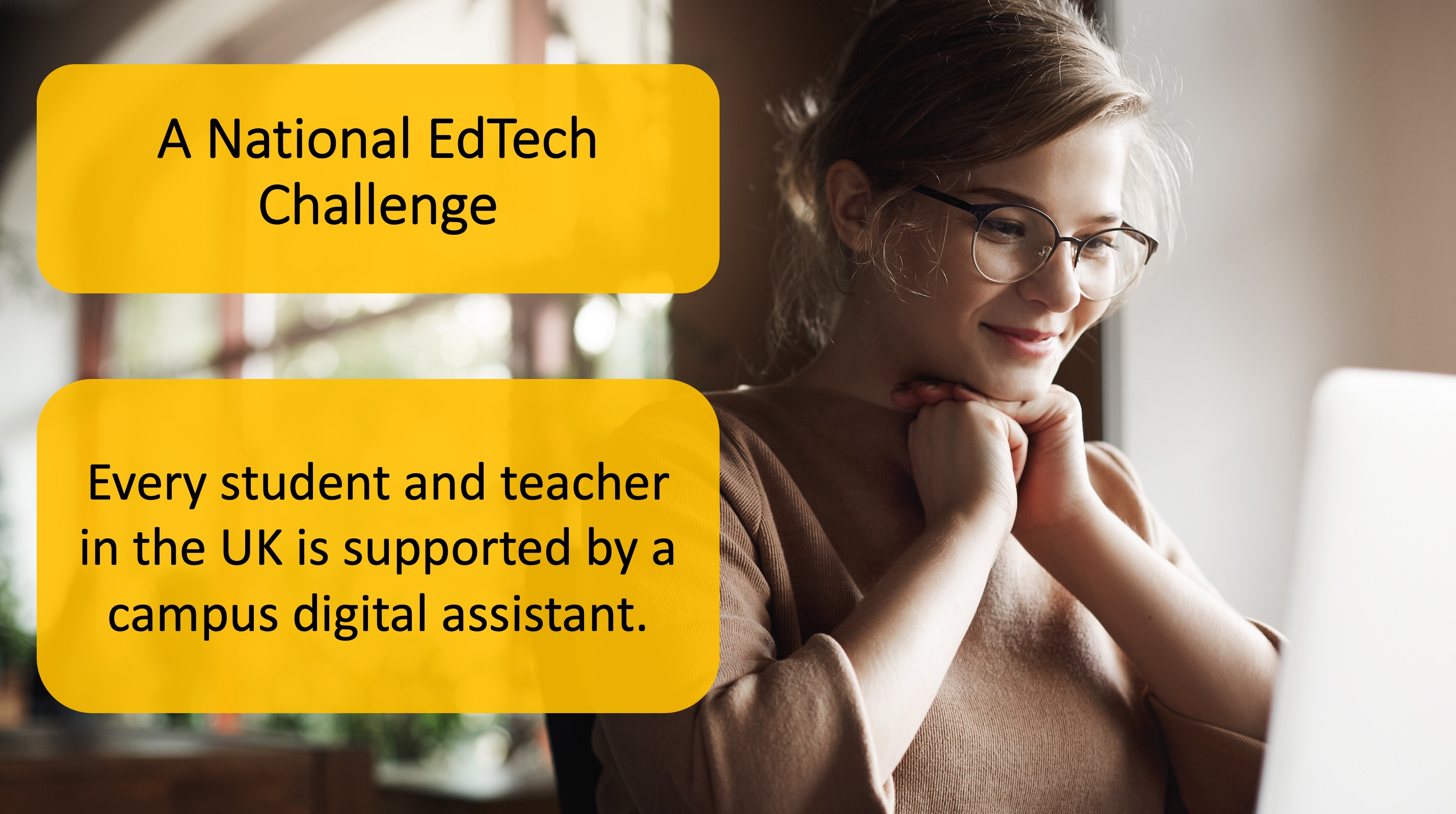A Digital Assistant for every student and teacher
In this short article I would like to explore a near future where every student and teacher in the UK is supported by a campus digital assistant. In this near future, the campus digital assistant is connected to all key datasets and services that are utilised by students, teachers and support teams. And in this near future, the campus digital assistant is leveraged to support every facet that makes up the student-life-cycle. If this near future is realised, the design, management, delivery and the use of day-to-day services on the campus is redefined.
The thoughts that lie at the heart of this change date back to the 1950s and 1960s. Norbert Wiener (1950), the founder of Cybernetics wrote that "we ordinarily think of communication and language as being directed from person to person. However, it is quite possible for a person to talk to a machine, a machine to a person, and a machine to a machine.” A decade later, Douglas Engelbart (1962) wrote that "users do not operate the computer. They communicate with it to accomplish a task. Thus we are creating a new arena of human action: communication with machines rather than operation of machines." The way students and teachers engage with digital services through the use of natural language is the hallmark of the campus digital assistant.
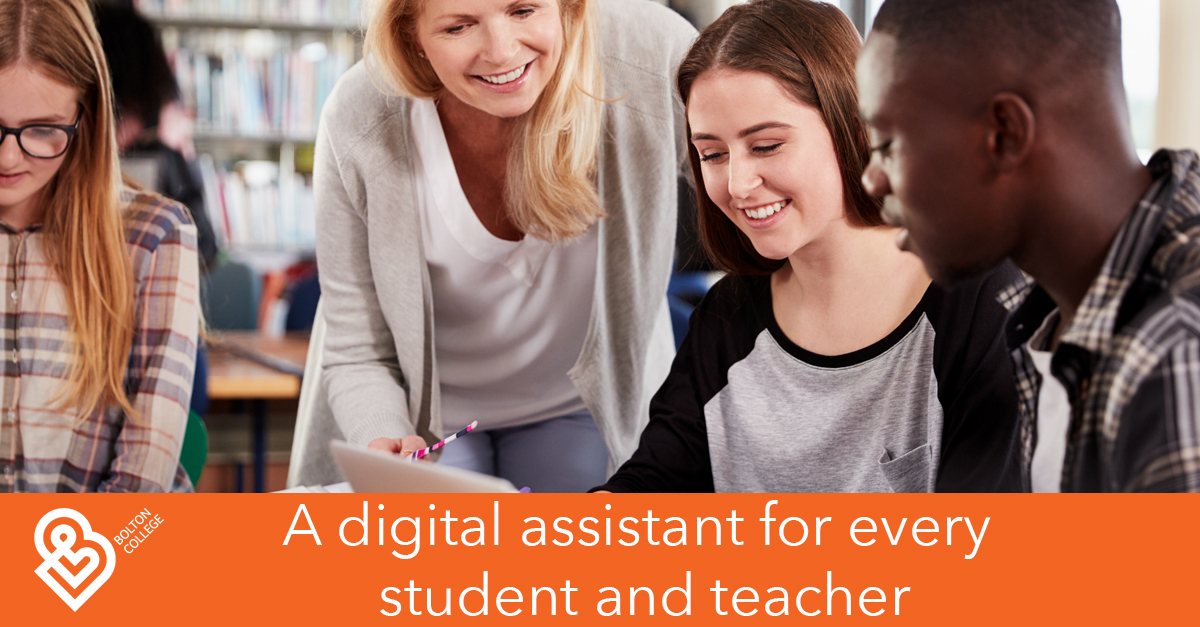
The development of Ada, Bolton College's digital assistant has enabled colleagues to question many of the long-held assumptions that underpin digital and off-line services that are provided by a modern campus. These questions also arise in other campuses who are on a similar journey to our own. Let's put this into some context with a few examples that highlight the many roles of a typical campus digital assistant:
- The campus digital assistant responds to all routine, day-to-day enquiries on the campus from students, employees and visitors.
- The digital assistant supports teachers to distribute personalised, contextualised and adaptive learning and assessment materials to each student at the institution.
- The digital assistant supports teachers with formative assessment as it offers real-time feedback to students.
- The digital assistant redefines how summative assessment is undertaken by tens of thousands of students around the UK.
- The digital assistant nudges students, teachers and support teams as it offers personalised and contextualised information, advice and guidance to individuals across the institution.
- The digital assistant supports teachers as it produces student report cards on their behalf. These report cards are presented to students on a weekly basis; highlighting the progress made on their courses and offering personalised and contextualised information, advice and guidance when necessary.
- The digital assistant answers phone calls from parents who wish to report their child as being absent from class because of a cold. The digital assistant takes the details of the caller, the student, the date, the classes missed and the reason for absence. Having taken these details, the digital assistant places these details into the class register for the teacher's attention. Likewise, the digital assistant can makes call on behalf of the school, college or university to students or to parents.
- The digital assistant develops growing domain knowledge across numerous curriculum areas such as Maths, English, Physics, Business and more. Campuses may specialise in developing discrete knowledge domains. If students or teachers pose questions to their local digital assistant, it may relay the queries onto other digital assistants before responding.
- The digital assistant becomes a composite of numerous intelligent agents that support discrete services and workflows around the campus. In doing so, it touches every point of contact or interaction within the institution.
- When the campus digital assistant is connected to all key datasets around the campus it enables colleagues to identify students who require additional support during their studies.
These examples and the ones shown in the diagram below represent a small selection of use cases for campus digital assistants. Nevertheless, they do offer a tantalising glimpse about the shape and form of emerging EdTech services that surround the use of campus digital assistants.
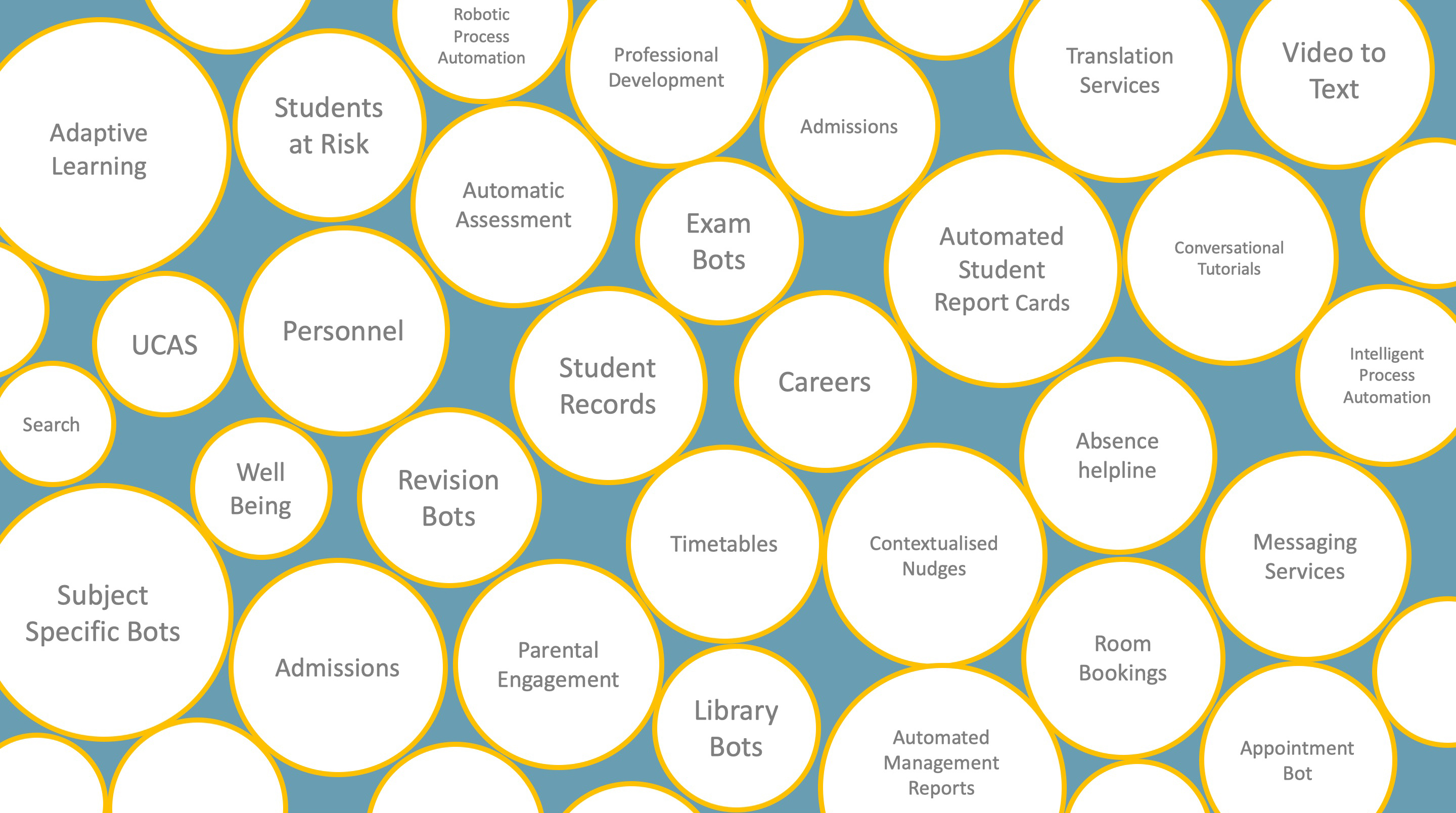
Context
Context lies at the heart of all campus digital assistants and the success of this new EdTech category depends on its ability to behave with a high degree of context. The sense of familiarity or awareness of the student's place in the student-life-cycle is a defining element of campus digital assistants and this separates them from other digital services that are currently prevalent in our schools, colleges and universities. Context enables campus digital assistants to inform, advise and guide students; and it enables these services to act on behalf of teachers and campus support teams to help students during their studies. The degree of context or familiarity will steadily become more pronounced; especially when the digital assistant is connected to further datasets around the campus; as it takes advantage of robotic process automation and when it starts to utilise intelligent process automation to inform its actions. For further information on context please refer to the article entitled: Why is context important for a digital assistant?
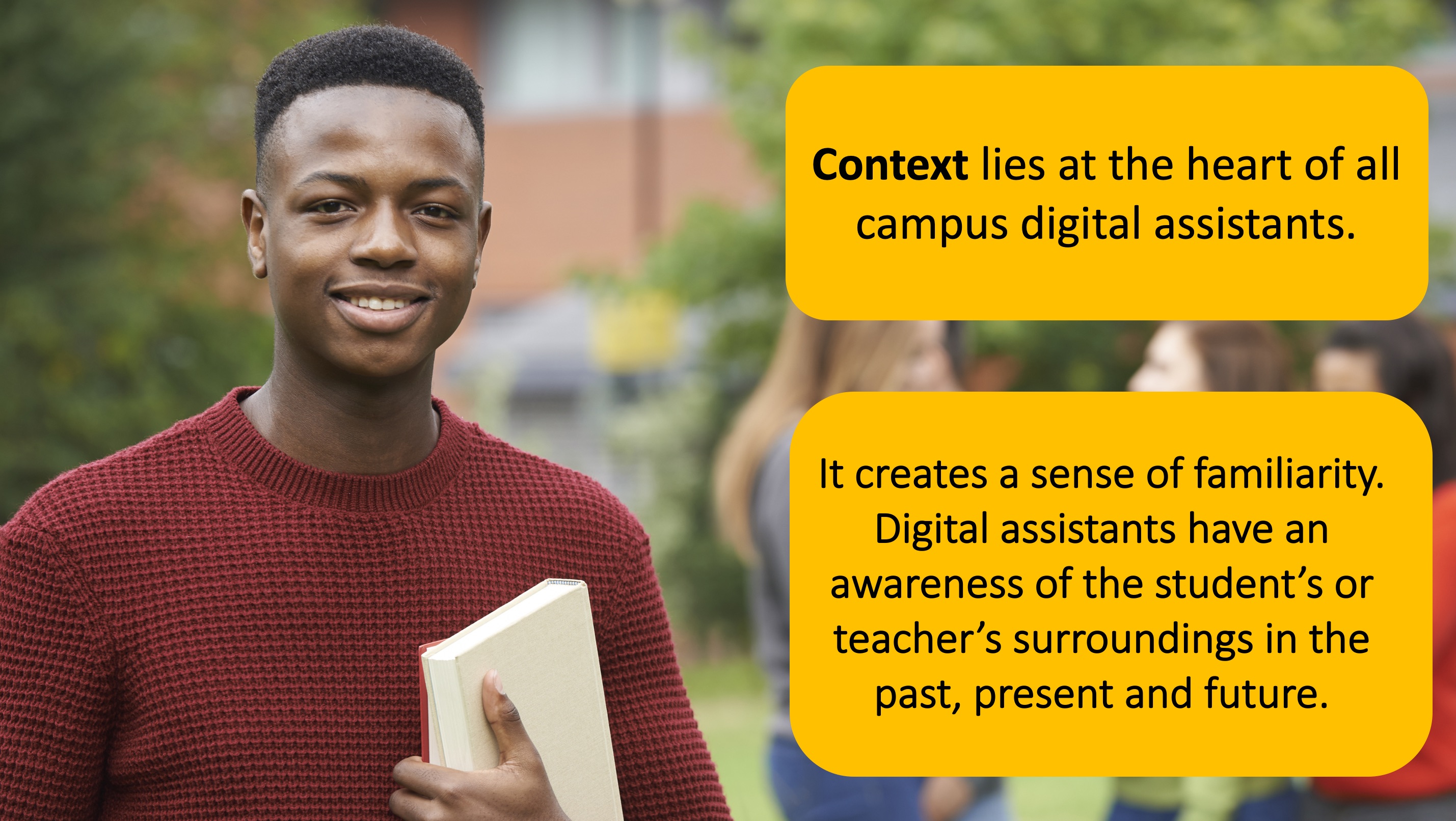
The evolution of the campus digital assistant
A campus digital assistant goes through three distinct phases as it matures. During stage one the service is initially a chatbot that is connected to all the key datasets across the campus. At this early stage, the chatbot does not act on behalf of anyone. However, as an oracle, it is capable of responding contextually to a myriad of day-to-day enquiries that are posed by students, teachers and support teams. During stage two, the service starts to behave with agency. Put simply, it starts to perform discrete and narrow tasks on behalf of students, teachers and support teams. Its actions are predetermined as it follows a well defined set of algorithms and workflows that underly the use robotic process automation. And during stage three, the campus digital assistant starts to function in a less deterministic manner as it starts to make use of machine learning and intelligent process automation to support its actions and tasks. As the campus digital assistant evolves it will perform cognitive tasks of increasing complexity. For example, in stage one the digital assistant responds contextually to enquiries from students and teachers; during stage two, the campus digital assistant automates the production of student reports cards and it makes and receives telephone calls on behalf of the institution; and during stage three, the digital assistant identifies the students who may require additional support and help with their studies and it helps teachers to assess student work.

A new EdTech category
An EdTech category is defined as a collection of services that are built around a
given technology. For instance, the web fostered the development of countless online services that support students, teachers and support teams. The same holds true for networked mobile devices. In the case of campus digital assistants we can expect to see numerous services that will be designed to expand the capabilities of the assistant. If you examine all the elements that make up the student-life-cycle it is easy to see what could be built within this EdTech category. These assistants will also transform many of the digital services that we have taken for granted over the last twenty years or more; especially when students and teachers start to engage primarily with their campus assistant to get things done.
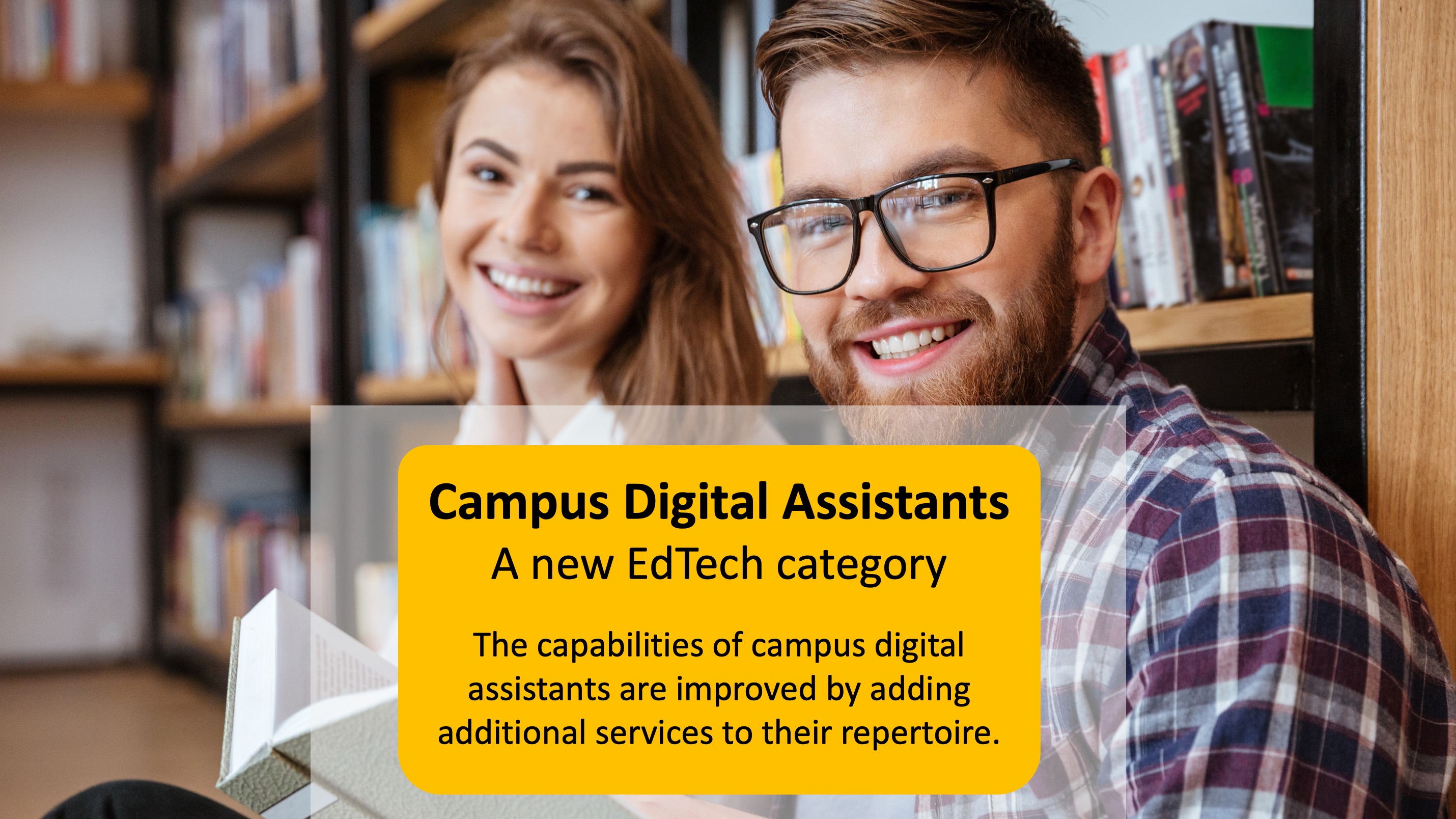
Campus digital assistants should be seen as a composite of multiple services or agents that perform specific tasks on behalf of students, teachers and support teams. For example, how does a digital assistant advise a student about the grade that he or she needs to achieve for a forthcoming assignment? In this case, there is an agent that is monitoring current academic performance, there is an agent that is aware of what the student wishes to progress onto after the course is over and there is an agent that offers real-time feedback to the student when authoring answers to assignments. When the campus digital assistant gathers the information from these agents it is in a position to offer contextualised information, advice and guidance to the student about the desired grade for the next assignment. In this instance, the campus digital assistant advises the student about an assignment grade; but the assistant will also advise and guide students and teachers across multiple contexts and situations; and it will also act on behalf of students, teachers and support teams across these contexts and situations.
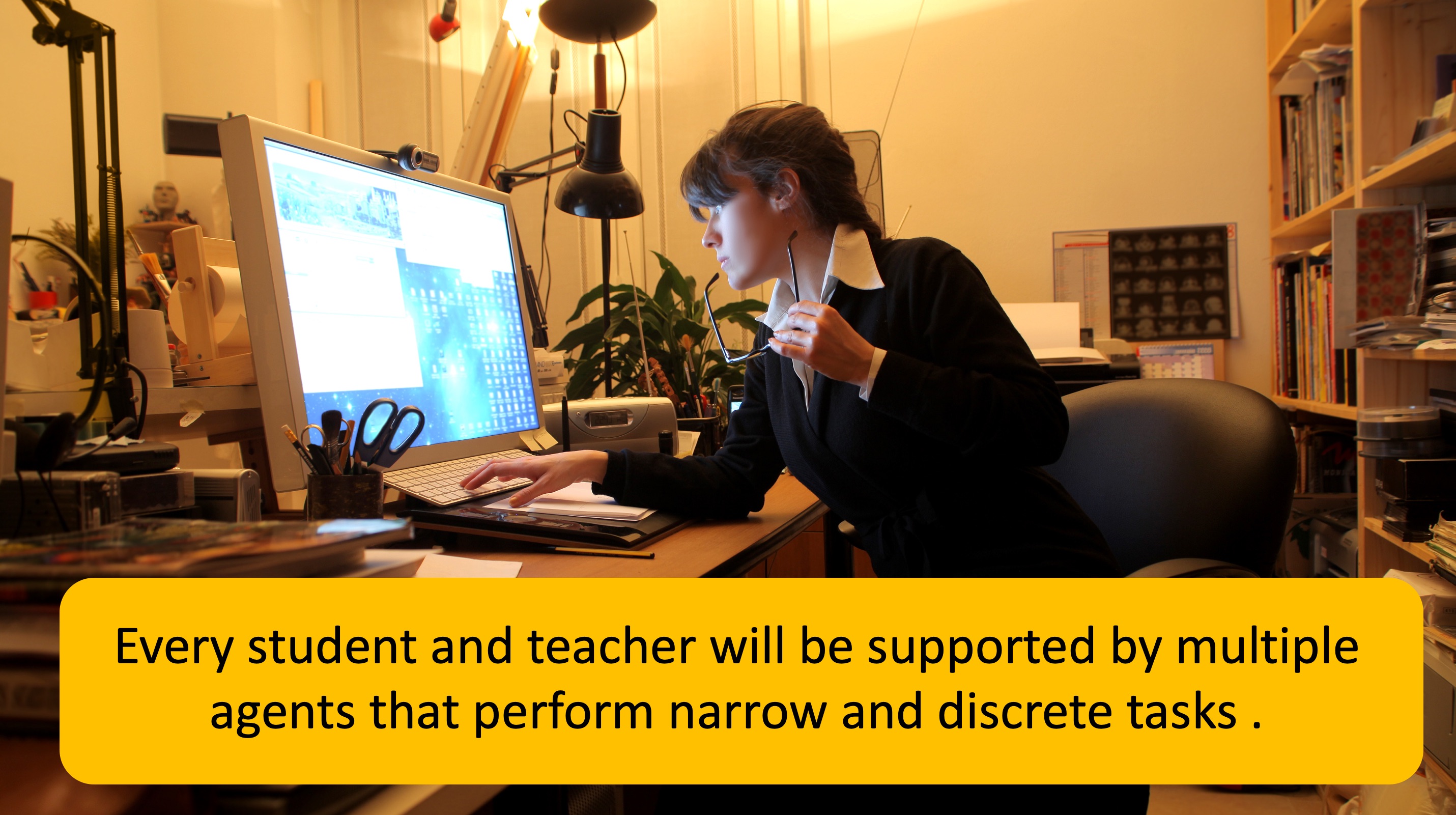
Ethics
As digital assistants mature they will help students, teachers and support teams with all aspects of their studies and work. They will also inform many of the decisions and actions that are taken by everyone on the campus. Since these decisions and actions have a direct bearing on the future of all our students; the decisions and actions of the digital assistant need to be explainable. It's important to note that all the stakeholders in our institutions need to be given the opportunity to shape and direct the behaviour of our campus digital assistants. If these services are designed with care and if the relationship between ourselves and these digital agents is mediated through campus AIED ethics groups then there is an opportunity to design campus digital assistants whose behaviour is explainable and moderated by the wider education community.
The digital assistant will invariably touch every facet of campus life. If this is the case, what does it mean to be a teacher or a student whose very presence on the campus is mediated by a digital assistant? The question was first posed by leading figures such as Joseph Licklieder, Norbert Wiener, William Ashby and Douglas Englebart during the 1950s and 60s were they sort to design and promote technologies that amplified our capacity to comprehend, create and problem solve.

Summary
The advent of the campus digital assistant marks an exciting period for
the education sector. If they are developed with care, they have the potential to transform the design, delivery and management of numerous services that are found in a campus setting. It is still early to ascertain the wider impact that digital assistants will have on teaching, learning and assessment; retention, achievement, progression or student and staff well-being. At Bolton College, we have seen how Ada adds significant value to students as they start and progress with their studies. There is no doubt that the introduction of the digital assistant on our campuses will be transformative; especially when they are offered to every student and teacher in our schools, colleges and universities. Once they are common place, it will be hard to imagine being a student or a teacher without them.
